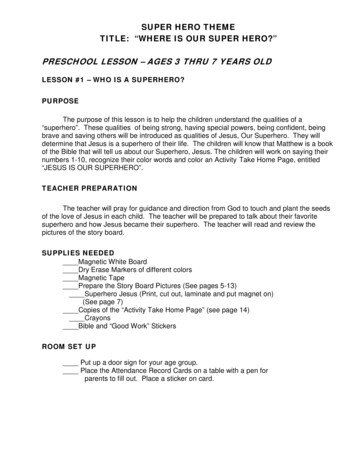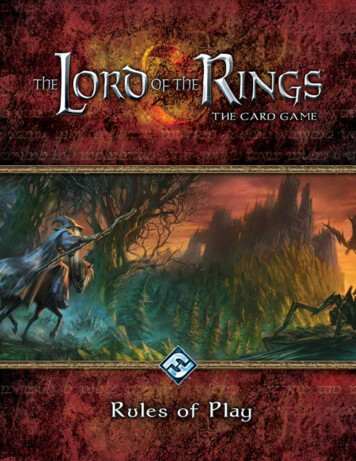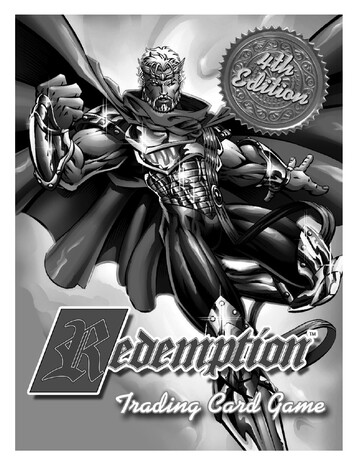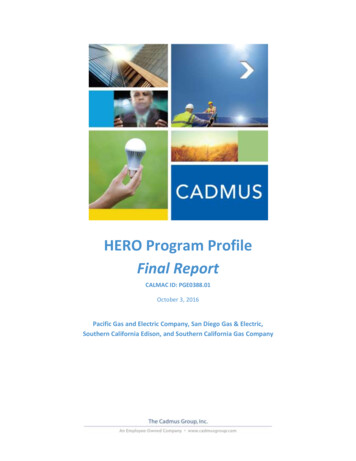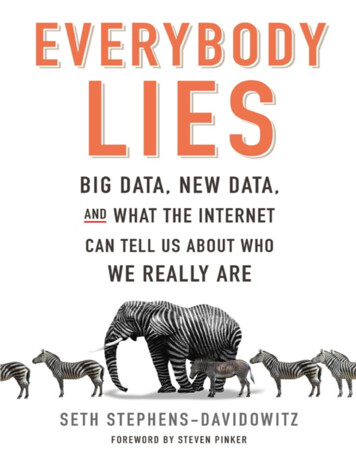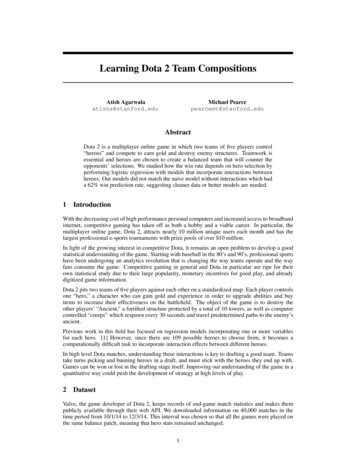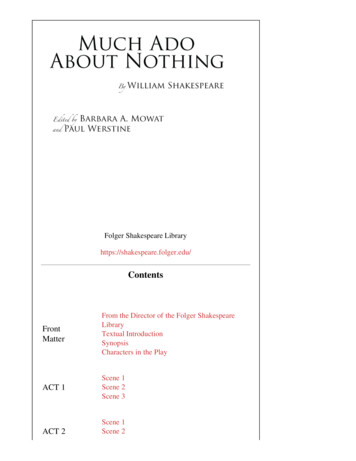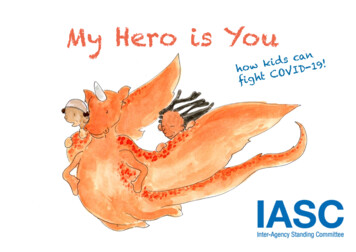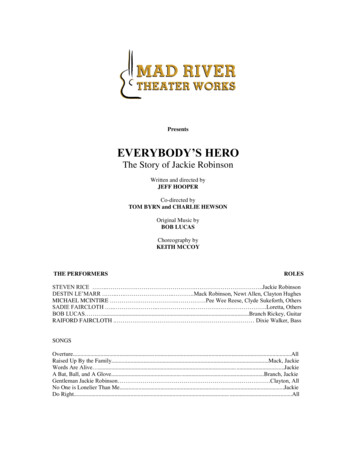
Transcription
PresentsEVERYBODY’S HEROThe Story of Jackie RobinsonWritten and directed byJEFF HOOPERCo-directed byTOM BYRN and CHARLIE HEWSONOriginal Music byBOB LUCASChoreography byKEITH MCCOYTHE PERFORMERSROLESSTEVEN RICE . . .Jackie RobinsonDESTIN LE’MARR . . . .Mack Robinson, Newt Allen, Clayton HughesMICHAEL MCINTIRE . Pee Wee Reese, Clyde Sukeforth, OthersSADIE FAIRCLOTH . . . . .Loretta, OthersBOB LUCAS .Branch Rickey, GuitarRAIFORD FAIRCLOTH . Dixie Walker, BassSONGSOverture.AllRaised Up By the Family.Mack, JackieWords Are Alive .JackieA Bat, Ball, and A Glove.Branch, JackieGentleman Jackie Robinson .Clayton, AllNo One is Lonelier Than Me.JackieDo Right.All
Note from the AuthorOne of the most significant challenges of creating a play about Jackie Robinson is how toshow the terrible abuse Robinson faced as he became the first African-American to playprofessional sports in the United States and still remain within the bounds of language andbehavior that are acceptable today. We live in an era when public racial slurs are not toleratedand discrimination has been outlawed at the state and federal levels. It is hard to believe the levelof prejudice faced by minority groups as recently as the 1950’s and 1960’s. When JackieRobinson was entering Major League Baseball in the 1940’s, institutional racism was even moreentrenched.We have tried to be sensitive in scenes that depict the name-calling and physical attacksreceived by Robinson. We have avoided many of the well-documented taunts and insults whilestill trying to give some sense of the hatred that Robinson faced every day. In one particular case,however, we felt it was important to use a word that Robinson heard repeatedly and hurt himdeeply.One of Robinson’s first confrontations with authority was his court martial by the UnitedStates Army in 1943. Robinson had joined the military in 1942 at the beginning of World War II.The Army was segregated, but Robinson was accepted to Officer Candidate School and became aSecond Lieutenant. He served as a morale officer and worked to improve conditions for AfricanAmerican soldiers. While stationed at Fort Hood, Texas, Robinson was riding on a civilian busand was told to move to “colored section” at the rear. He refused and was arrested by theMilitary Police.Robinson was within his rights. The Army had recently outlawed segregation on busesserving the military. But during his arrest, Robinson was repeatedly called a “nigger” by thearresting officers and it made him very angry. The trial transcript shows that the use of this racialslur was an important factor in his acquittal.“Nigger” is one of the most highly charged and controversial words in the English language.It is normally a word we would never use on stage, however, it is critical to the story. ComposerBob Lucas wrote a powerful song called “Words Are Alive” to show the wounds Jack receivedby being called this name. It only appears once, but we hope that the context will make it veryclear to students that words can be as hurtful and destructive as a slap in the face.Jackie RobinsonJackie Robinson, one of the most significant baseball players in the history of the game, gothis professional start in Kansas City. While playing short stop for the war-depleted Monarchs in1945 he was spotted by Branch Rickey, the general manager of the Brooklyn Dodgers. Two yearslater he became the first black man to play in the modern major leagues.Robinson was born in Georgia and raised in Pasadena, California. A superb athlete, heexcelled at every sport he attempted. He achieved stardom at UCLA, where he became the firstfour-letter athlete in that university's history. Following his discharge from the Army in 1944, heaccepted a position teaching physical education at Samuel Huston College in Austin, Texas. Thefollowing year, Monarchs founder and owner J. L. Wilkinson, acting on a tip from pitcher HiltonSmith, invited him to try out for the team during their spring training in Houston.During his one season in the Negro Leagues, Robinson proved himself to be an outstandinghitter, a skilled and aggressive base runner, and was one of the best infielders in the league. Hisspot on the Monarchs' roster proved to be instrumental in securing his part in "baseball's greatexperiment." During that season Branch Rickey scoured the Negro leagues under the pretext of
finding players for a new all-black league he was starting. Only his closest associates knew thatRickey was actually looking for just the right player to lead an assault on baseball's 60-year-oldcolor barrier.Robinson signed with the Dodgers after the 1945 season. He played on their top farm team in1946, entered the major leagues the following year, and put together a spectacularly successfulten-year career in the majors. Among his long list of achievements, in 1962 Robinson became thefirst black player inducted into the Baseball Hall of Fame.About the CompanyMad River Theater Works is a professional touring theater company based in West Liberty,Ohio. Our purpose is to craft plays that are both drawn from and produced for the people of thefarms and small towns of rural America, and to communicate the concerns and insights of ourcommunities to people everywhere. Since 1978 we have collected stories, molded this materialinto plays, and performed our work at community centers, schools, colleges, and theatersthroughout the United States reaching an annual audience of over 50,000 through over 200performances.Mad River Theater Works is one of only a handful of professional theaters in the United Statesbased in rural communities. Our unique mission has attracted the support of the NationalEndowment for the Arts, as well as foundations, corporations, and individuals.The ArtistsSteven Rice (Jackie Robinson), Steven Isaac Rice is a recent graduate of Samford Universityin Birmingham, AL, achieving a BFA in Musical Theater. He discovered in high school that hewanted to perform for the rest of his life and has been doing so ever since. He was featured in theSamford musical Thoroughly Modern Millie as Bun Foo his freshmen year and was also CalFarber in the opera one-act Different Fields. Other favorite parts include Phil Davis in WhiteChristmas and Henrik Egerman in A Little Night Music. Steven dedicates every performance tohis family, who have always been there supporting him in everything he does. “To love anotherperson is to see the Face of God.” –Les Miserables.Destin Le’Marr (Newt, Reporter) Destin is a national performer and speaker who hasdedicated his life to inspiring people to impact the world around them. Destin studied theaterperformance at Hampton University (Hampton, Va) as well as Coppin State University(Baltimore, MD). His most notable theatrical credits include, Asagai in A Raisin in the Sun, TheTin Man in The Wiz, and Agwe in Once on This Island. Currently, Destin travels the countryspreading the power of positivity, purpose, and progress through performing arts to educationaland political groups at various conferences, workshops, and seminars. This is his first tour withMad River Theater Works.Bob Lucas (Branch Rickey, Ensemble, Composer) is a glory shouting, sweet singing, stringbending, banjo picking, guitar thumping, old time dance fiddling, song writing rounder with adesire to share a sense of musical wonder anyway he can. Coming up in the great folk scare of the60’s he was fortunate to be taken under wing by some of the greatest traditional musicians andsingers. It is the wonder of that era that still holds keen with him. He was raised in a singingfamily of boys who all thought they might be God’s gift to music. Being musically uppity has forthat reason always come natural for him. As the times turned hip in the late 60’s he too became apart of that culture. In 1972 he released The Dancer Inside of You on BRGQ records a very smalllabel in Bloomington Indiana. That record received a 4 star rating from “Downbeat Magazine”.Two songs off Dancer were picked up and recorded by the legendary Newgrass Revival. Theyrecorded many of his songs in the years that followed and his songs can still be found on the
current recordings of the Greats Sam Bush and John Cowan. Bob was co-founder of the “culturemorphing” band Eclectricity in 1977. Being one of the first ever bands to bring “gypsy” and“klezmer” music to a North American folk music audience. Eclectricity found a fan in and oftentoured with actor/singer Theodore Bikel. It was at this time Bob learned that the word“macaronic” has nothing to do with pasta. In 1986 he began working for Mad River TheaterWorks writing songs and making plays for what has become an ever-growing audience. Two ofhis songs have been recorded by the blissfully talented Alison Krauss, on her 1996 GrammyAward winning album, So Long So Wrong. She has since recorded two more of Bob’s songs onher album New Favorite. In addition to the vinyl recordings Bob released early in his career hehas two CD’s, Rushsylvania and Kin. He has begun work on a new CD called Banjo for Lovers,which he hopes to complete soon.Sadie and Raiford Faircloth (Loretta, Dixie, Musicians) are talented and experiencedperformers with a passion for music and telling stories. Originally from Memphis, Tennessee,Sadie grew up playing the piano and singing with her family. Raiford’s father was a recordingartist for Decca Records and began performing with his father’s band when he was only ten yearsold in Chattanooga, Tennessee. Sadie and Raiford were married in 1973 and have played in bandstogether ever since including Bluebird Special, Studillac, the Modulators, and Crosseyed Cat.Well-known to college and coffeehouse audiences across the country, Sadie and Raiford areappearing with Mad River Theater Works for the second time. They bring outstandingmusicianship and a keen awareness of the importance of the history of the Civil Rights movementto their roles in Everybody’s Hero.Michael McIntire (Pee Wee Reese) is from Cincinnati and has been entertaining audiencessince he was six years old. He studied theater and music at the Cincinnati School for Creative andPerforming Arts. Working as a musician and songwriter for the last twenty years, he has leadbands and composed for TV, Film, Opera, and Dance. He wishes to bring love and light to everyperformance he gives. This is his first tour with Mad River Theater Works.Jeff Hooper (Writer, Director) is the founding director of Mad River Theater Works. Hiswriting and direction credits include work at Actors Theatre of Louisville, Indiana RepertoryTheatre, Arena Stage in Washington, D.C., Berkeley Stage Company in Berkeley, California andRoadside Theater of Whitesburg, Kentucky. He was also a Founding Director of the Half MoonTheater in London, England. He has written over twenty-five original scripts for Mad RiverTheater Works including Captive Heart, John Henry, Freedom Bound, Wings of Courage, andThe Legend of Casey Jones. He also collaborated with Native American Poet Lance Henson tocreate Cry of the Americas and Coyote Road and directed the premiere of John Olive's Evelyn andthe Polka King at the Humana Festival of New American Plays at Actors Theatre of Louisville in1992. Coyote Road has been translated into French and was presented in 2001 at the TheatreMontansier in Versailles, France. He was awarded an Ohio Arts Council Playwriting Fellowshipin 1989-90 and has served on numerous panels for the National Endowment for the Arts, the OhioArts Council, the Massachusetts Cultural Council, and the Florida Arts Commission. He is also asite reporter for the NEA.Keith McCoy (Choreographer) is an original cast member of Everybody’s Hero. Keith hashad extensive touring experience with Theatre IV, the Lexington Children’s Theatre, and theOmaha Children’s Theatre and has appeared at numerous other regional theaters as well asseveral theme parks. Some of his favorite roles were Pedro in Man of La Mancha and Aladdin inGenie of the Lamp at the Mac-Hayden Theatre, Jim in Big River, the Mayor in the Pied Piper atTheatre IV. Keith graduated from Norfolk State University.
Well-known to college and coffeehouse audiences across the country, Sadie and Raiford are appearing with Mad River Theater Works for the second time. They bring outstanding musicianship and a keen awareness of the importance of the history of the Civil Rights movement to their roles in Everybody's Hero.
